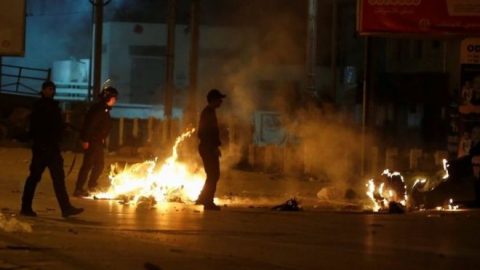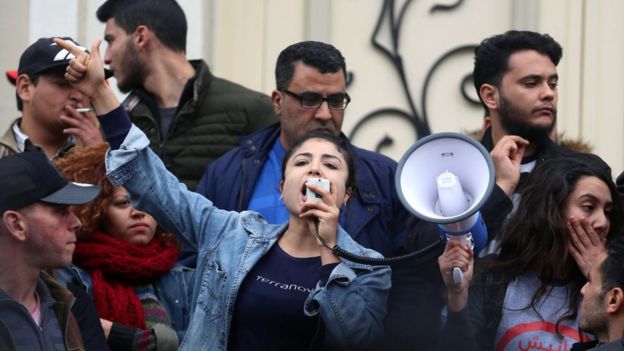
Tunisia hit by new anti-austerity protests
Protesters across Tunisia have rallied for a third successive night, as anger over the government’s austerity measures spilled over into unrest.
Police used tear gas against large crowds demonstrating against price rises affecting basic goods.
PM Youssef Chahed condemned acts of “vandalism” by the protesters, saying they were trying to weaken the state.
Nearly 240 people have been held, officials say. One person has died and 49 police officers have been injured.
What is the extent of the protests?
Protests have taken place in at least 10 different areas, including the capital, Tunis, in the last few days.
The protests began peacefully last week, but escalated on Monday evening.
The government has accused demonstrators of torching police cars and attacking officials.
 Image copyrightREUTERS
Image copyrightREUTERSThe defence ministry said the army was now protecting banks, post offices and other government buildings in Tunisia’s main cities.
Demonstrators have also accused police of a violent crackdown.
“The protests are over the cost of living,” one protester in Tunis told the BBC. “Prices of medicine have increased. Everything has, and salaries have not. I don’t think this is the right time for price hikes.”
Big rallies are planned for Friday.
Why are they protesting?
The demonstrators are demanding the government drop the 2018 budget, which opposition groups describe as unfair. They also want to see better welfare payments for struggling families.
The protests come after the government announced an increase in value-added tax and social contributions in the budget.
The new financial year has also brought with it price hikes on some goods and increased taxes on imports.
What is the economic situation in Tunisia?
Tunisia has been struggling with finances since the 2011 revolution, when Zine El Abidine Ben Ali – who ruled for more than 20 years – was forced to flee.
The revolution was sparked by the country’s high unemployment rates and worries about corruption.
Seven years on, and nine governments later, some of those same problems remain – not helped by a number of terrorist attacks which have damaged Tunisia’s tourism industry and foreign investment opportunities.
In December 2017, the International Monetary Fund told Tunisia it needed to take “urgent action” and “decisive measures” to reduce its deficit.
The IMF gave the country a $2.9bn (£2.2bn) loan in 2015.
Mr Chahed has said Tunisians can look forward to better times ahead.
“People have to understand that the situation is extraordinary and their country is having difficulties, but we believe that 2018 will be the last difficult year for the Tunisians,” he said on Tuesday.
–
Source: http://www.bbc.com/news/world-africa-42644326






